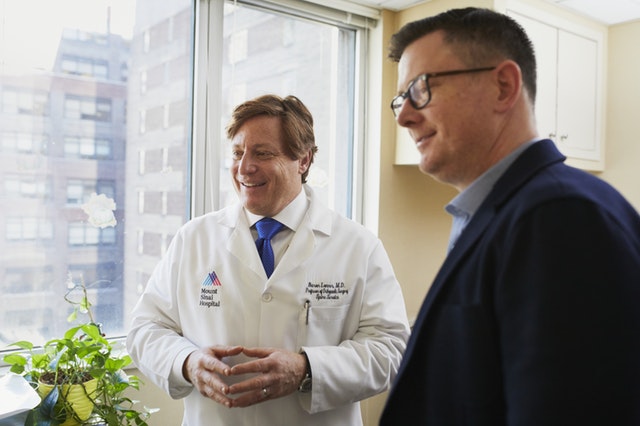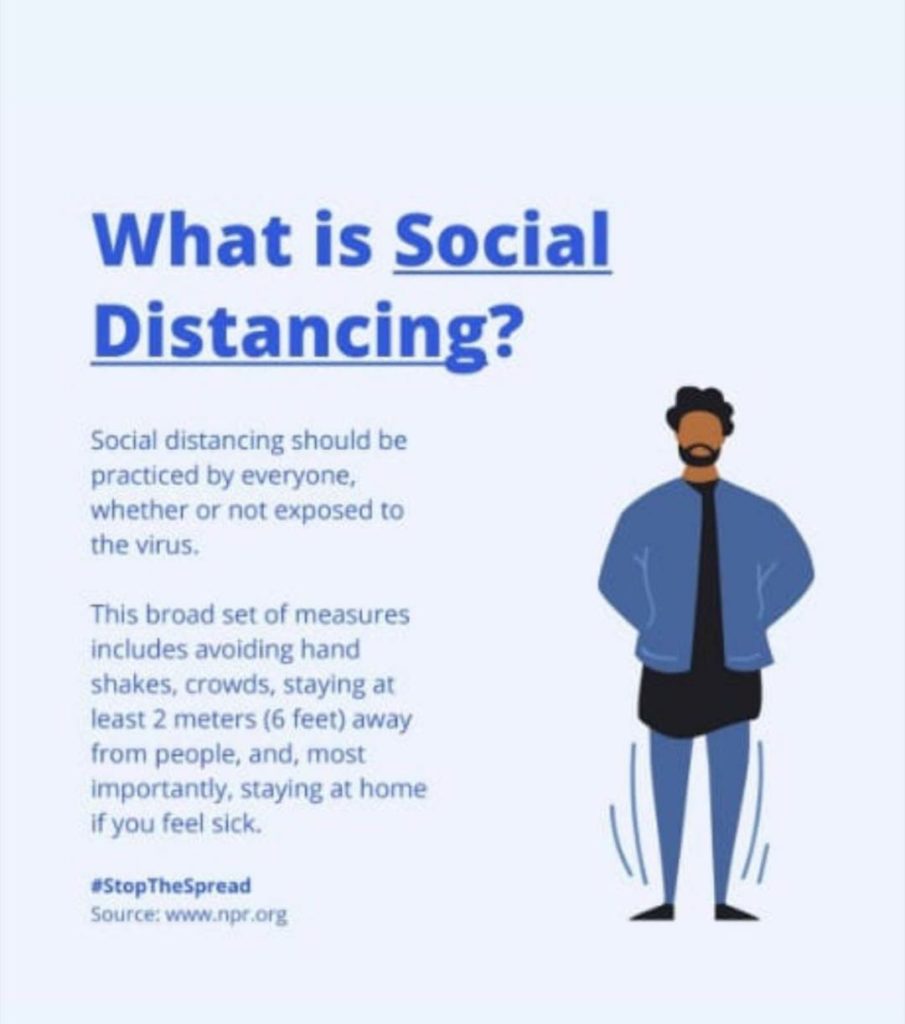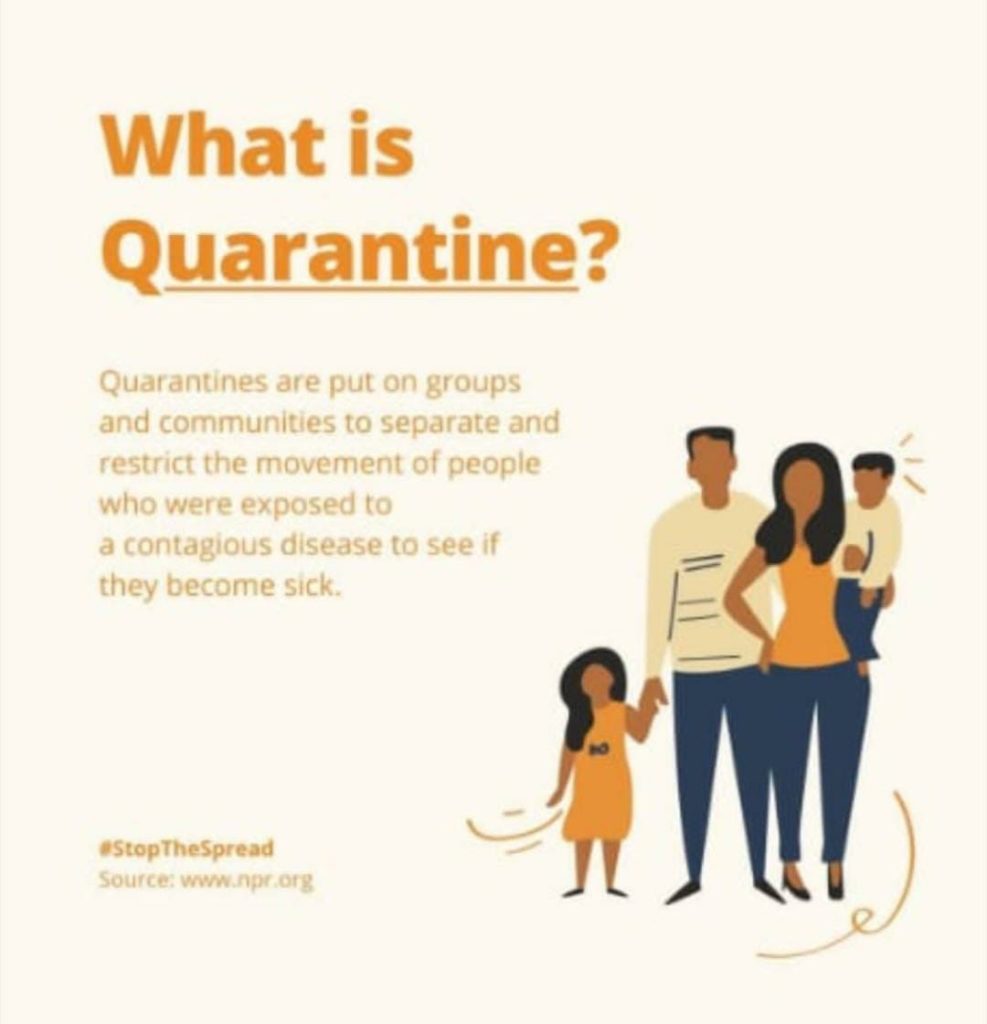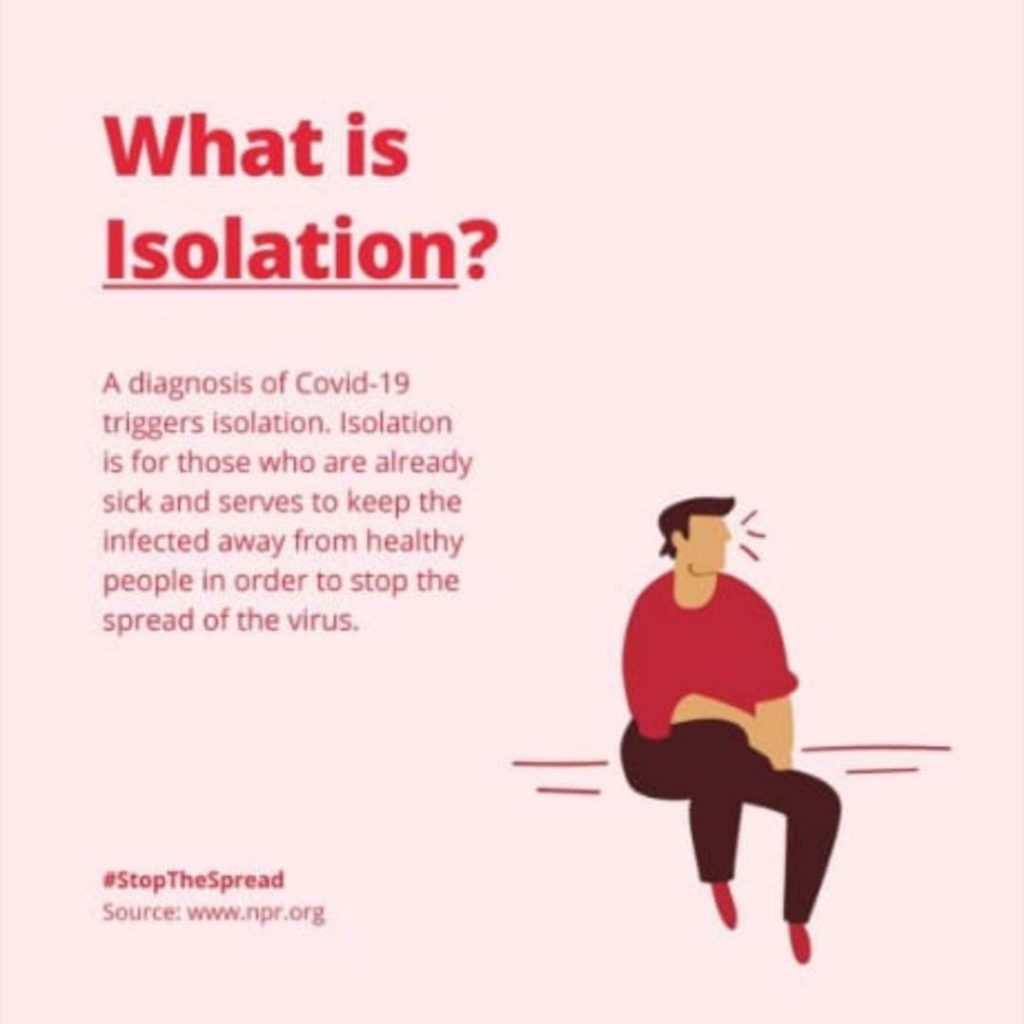Corona viruses (CoV) are a large family of viruses that are transmitted between animals and people which causes illness ranging from the common cold to more severe diseases.
Corona viruses sport spiky projections on their outer surfaces that resemble the points of a crown, or “corona” in Latin.
Okay.. so how is COVID -19 different from CoV: Corona virus disease abbreviated as COVID-19 is a new strain that was discovered in 2019 and has not been previously identified in humans.
Is Corona Virus (CoV) new to the Human Race: No, these viruses have been responsible for several outbreaks around the world in the past in different forms as follows:
Corona Virus had come back in the form of Severe Acute Respiratory Syndrome (SARS-CoV) pandemic of 2002-2003.
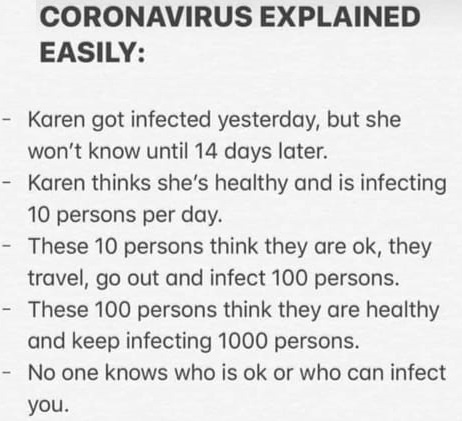 As Middle East Respiratory Syndrome (MERS-CoV) outbreak in South Korea in 2015, As a novel corona virus (SARS-CoV-2, also known as COVID-19) on 31 December 2019, which triggered an outbreak in China in December 2019, sparking international concern. (which was initially informed of a cluster of cases of pneumonia of unknown cause detected in Wuhan City, Hubei Province of China).
As Middle East Respiratory Syndrome (MERS-CoV) outbreak in South Korea in 2015, As a novel corona virus (SARS-CoV-2, also known as COVID-19) on 31 December 2019, which triggered an outbreak in China in December 2019, sparking international concern. (which was initially informed of a cluster of cases of pneumonia of unknown cause detected in Wuhan City, Hubei Province of China).
While some corona viruses have caused devastating epidemics, others cause mild to moderate respiratory infections, like the common cold. Several known corona viruses are circulating in animals that have not yet infected humans. Now since, you have come this far, why not get fully educated about corona!
Also Read: Mental Impact of lockdown and 4 key tips to become Mentally Healthy and Strong
What are the Common signs of corona viruses infection?
- It includes respiratory symptoms, fever, headache, sore throat, cough, shortness of breath and breathing difficulties.
- In more severe cases, infection can cause pneumonia, severe acute respiratory syndrome, kidney failure and even death. Rarer symptoms include dizziness, nausea, vomiting and a runny nose.
- In a subset of individuals, including those with cardiopulmonary disease or a weakened immune system, the viral infection can progress to a more severe lower-respiratory infection such as pneumonia or bronchitis.
Any recommendations to prevent the infection?!
Standard recommendations to prevent the infection spread include the following common sense steps:
- Regular hand washing with soap and water for at least 20 seconds.
- Wash every time after going to a public place, or after blowing your nose, coughing or sneezing.
- If soap and water are not readily available, use a hand sanitizer.
- Avoiding touching your face, eyes and mouth. If you have this habit, make other activities in your left hand such as (bathroom, lift ,door knobs etc) where as eating etc from your right hand.
- Cover mouth and nose when coughing and sneezing
- Thoroughly cooking food before consumption
- Avoid close contact with anyone; especially with people showing symptoms of respiratory illness such as coughing and sneezing.
- Distance between yourself and other people if COVID-19 is spreading in your community.
- Stay home if you are sick, except to get medical care.
- Cover your nose and mouth with a tissue when coughing or sneezing; throw used tissues in the trash.
- If a tissue isn’t available, cough or sneeze into your elbow or sleeve but never into your hands.
- Make your immune system strong.
How does the corona virus actually spread?
Corona viruses can be transmitted between humans through respiratory droplets that infected people expel when they breathe, cough or sneeze.
The viruses generally cannot survive for more than a few hours on surfaces outside a human host, but people can pick up a corona virus from a contaminated surface for a short window of time.
How long is the incubation period of the corona virus, i.e. the period between infection by the virus and appearance of the first symptoms?
The incubation period of the corona virus is 2–14 days before signs of disease. Therefore it’s advisable to stay home for 14 days from the time you left an area with widespread, ongoing community spread (Level 3 Travel Health Notice countries) and practice social distancing.
Social Distancing and Steps to monitor your health:
- Record your temperature with a thermometer two times a day and monitor for fever. Also watch for cough or trouble breathing.
- Stay home and avoid contact with others.
- Do not report to office or anywhere for this 14-day period.
- Discuss your work situation with your employer before returning to work.
- Do not take public transportation, taxis, or ride-shares during the time you are practicing social distancing.
- Avoid crowded places (such as shopping centers and movie theaters) and limit your activities in public.
- Keep your distance from others (about 6 feet or 2 meters).
- Now that the new corona virus and COVID-19, the illness it causes, are spreading among communities across countries, phrases such as “social distancing,” “self-quarantine” are showing up in the media.
So what exactly is Quarantine and how is it different from Isolation?
Quarantine is used to separate and restrict the movement of well persons who may have been exposed to a communicable disease to see if they become ill. These people may have been exposed to a disease and do not know it, or they may have the disease but do not show symptoms.
Health experts recommend that self-quarantine lasts 14 days. Two weeks provides enough time for them to know whether or not they will become ill and be contagious to other people.
Self-quarantine involves:
- Using standard hygiene and washing hands frequently
- Not sharing things like towels and utensils
- Staying at home
- Not having visitors
- Staying at least 6 feet away from other people in your household
- Once your quarantine period has ended, if you do not have symptoms, follow your doctor’s instructions on how to return to your normal routine.
ALSO Read: Have a pending goal? Plan smartly to achieve it.
Isolation is used to separate ill persons who have a communicable disease from those who are healthy. Isolation restricts the movement of ill persons to help stop the spread of certain diseases.
Also, the corona virus pandemic is making everyone aware of hand washing and protecting others from coughs and sneezes. Along with those essential steps, practices such as social distancing, and self-quarantine and isolation when appropriate can slow the rate of infection in a city, town or community.
The pandemic can seem overwhelming, but in truth, every person can help slow down the spread of COVID-19. By doing your part, you can make a big difference to your health, and that of others around you.
How Self quarantine can make a DIFFERENCE?!
Well, all certain done, however can you consider it as a blessing in disguise to all the opportunists?
Maybe this corona virus-enforced lock down or slowdown is the perfect opportunity to make the best use for self-improvisation and self enhancement. For instance, much like the corona virus pandemic ravaging the globe right now, Isaac Newton too had witnessed a serious illness during his time.
Yes, that was the Great Plague that hit London when the mathematician, physicist and astronomer was in his early 20s, allowed him to make some of his biggest discoveries, including the theories of gravity and motion and made another student of Trinity College, Cambridge a “Sir:, with the big formal wig”.
Facts Vs Fiction regarding CoVID 19!
At this point in the story, it’s worth mentioning that cyber-criminals exploit the corona virus panic by creating hundreds of fraudulent websites, selling fake information and home test kits to steal people’s data and money. Cyber security experts reported that since January more than 4,000 corona virus-related domains have been registered and about 300 of them are believed to be ‘malicious’ or ‘suspicious’.
Fictions/Myths regarding the COVID 19 includes, but not restricted to are:
MYTH 1: Experts have mentioned that the “hold your breath for 10 seconds” test is totally nonsense.
As Most young patients with corona virus will be able to hold their breaths for much longer than 10 seconds and many elderly without the virus won’t be able to do it.
Getting COVID-19 is a death sentence.
That’s not true.
About 81% of people who are infected with the corona virus have mild cases of COVID-19, About 13.8% report severe illness, meaning they have shortness of breath, or require supplemental oxygen, and about 4.7% are critical, meaning they face respiratory failure, multi-organ failure or septic shock. The data thus far suggests that only around 2.3% of people infected with COVID-19 die from the virus. People who are older or have underlying health conditions seem to be most at risk of having severe disease or complications.
MYTH 2: It’s not safe to receive a package from China
False!
It is safe to receive letters or packages from China, according to the World Health Organization as research has found that corona viruses don’t survive long on objects such as letters and packages.
The surfaces present in packaging are not ideal for the virus to survive. For a virus to remain viable, it needs a combination of specific environmental conditions such as temperature, lack of UV exposure and humidity — a combination you won’t get in shipping packages.
MYTH 3: The intensity of COVID-19 would taper down with high temperatures.
False.
The impact of the virus is as serious in hot-humid weather conditions of Singapore as in the colder environment of European countries.
MYTH 4: Do face masks protect against transmission?
No, a face mask does not protect a healthy person from getting COVID-19. If you are ill, a face mask may to some extent prevent droplets from spreading around you when you cough or sneeze.
 All in all, what we would like to say is there’s no need to panic. All we need to do is to take steps to prepare and protect ourselves and others. Let’s not only have theoretical knowledge this time but lets also ensure we strictly follow the same.
All in all, what we would like to say is there’s no need to panic. All we need to do is to take steps to prepare and protect ourselves and others. Let’s not only have theoretical knowledge this time but lets also ensure we strictly follow the same.
Build your immunity and spread awareness among your loved one about COVID 19 and how can we tackle it by pretty much doing nothing. This is the time to watch multiple binge series, work on pending thesis, create anew hobby, perfect the art of cooking, start preparing for a job change or any thing you have kept pending for a long time. If you have any other ideas/queries, feel free to post in our comment section.
For people still looking for answer for the question in the title, corona virus could be a simple cold but COVID 19 is something that newly emerged and causing pandemic.
Team Jumpwhere wishes you all a safe health!
Also Read:


